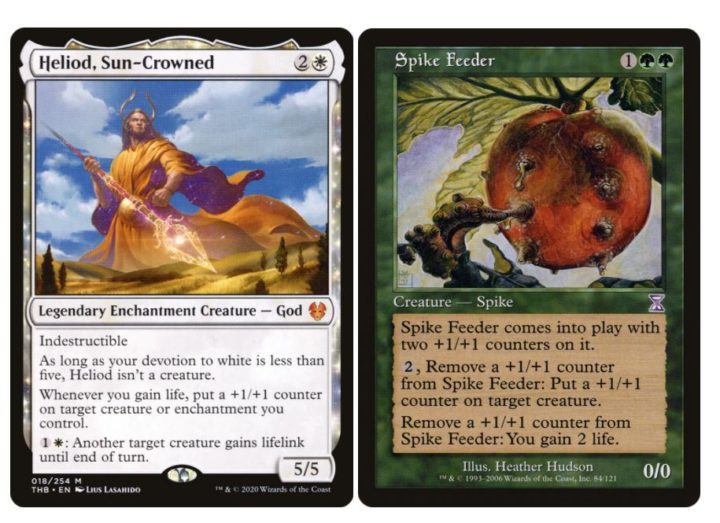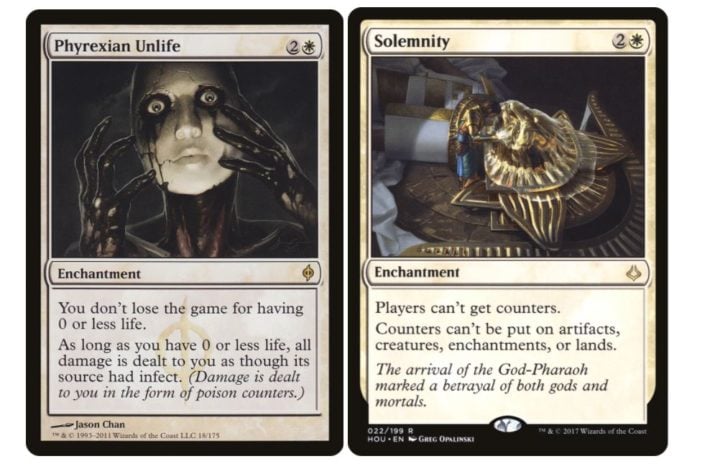For all that we Magic players love to think analytically and break things down, there are still some hugely impactful blind spots in community discussion of the game. This week’s Magic Online Championships thrust one into the spotlight, as a controversial finish to Oliver Tiu vs. Michael Jacob led to fiery online debate about cheating, “angle-shooting” and the moral grey areas of Magic.
Fortunately, that situation was resolved to the satisfaction of all parties, but I think there’s still a wider discussion to be had. I’m sure the vast majority of players are united against flagrant cheating, like marking cards or illegally sneaking extra lands into play between turns. But every game of Magic runs a high risk of human error and miscommunication; for some, the goal of the game is to force those mistakes from your opponent. Ultimately, every player must decide their own code of honor — but it’s hard not to take it personally when someone reveals that their idea of “fair play” doesn’t line up with your own.
ANGLES AND DEVILS
If you spend any amount of time playing Magic competitively, or even just against strangers, you’ll run up against the phenomenon of “angle-shooting.” The term was adopted from poker, and Poker.com gives an excellent and universal definition:
“Angle shooting is a controversial part of poker. While not quite cheating, in some cases, it is essentially finding ways of exploiting ambiguous or weak areas of the rules in order to gain an advantage over other players. This is more than just pushing rules to their limits – it is travelling to the outer edges of fair play. For the most part, the spirit of the angle shooter is that of a cheat, but even the fairest of poker players may try to find an angle when in dire straits.”
Magic’s Comprehensive Rules is an impressively robust document for a fantasy card game, but so long as humans are responsible for applying those rules, there will be chances to angle-shoot, and thus areas where personal judgment and morality impact the result. Specifically, a lot of Magic’s angle-shooting revolves around the awkward etiquette of a game where players must cooperate to maintain a shared understanding of the game state — all while simultaneously bluffing each other into misreading the next one.
There are also situations where angle-shooting leans on other unfortunate intersections between in-game intent and some form of real-world logistics. The Tiu vs. Jacob MOCS match was such a case. Michael Jacob assembled the combo of Heliod, Sun-Crowned plus Spike Feeder, which allows you to gain infinite life. But since the match was on MTGO, Jacob had to manually click through the loop for each activation. Another feature of MTGO is that each player has their own match timer; if Jacob spent too long gaining “infinite” life, he would actually lose the match!

Rather than attempt the dizzying math of calculating how many minutes he could afford to waste clicking Spike Feeder, Jacob offered Tiu the kind of agreement you would see in paper — could they both simply assume he now had infinite life and continue playing to see if Tiu could win some other way, perhaps by milling him? Tiu seemed to have agreed in the moment, and stopped attacking Jacob. But his hopes of winning this way were slim. When he was about to lose on time, Tiu suddenly went back on his word; he started attacking Jacob’s life again. Since they had agreed he didn’t need to use the combo — and it had since been removed from play — Jacob’s life total was nowhere near high enough to survive, and MTGO recorded a win for Tiu.
This angle-shoot might seem like a unique case — only in the highest levels of professional competition, with judges watching, would a player rely on such a “verbal” agreement overruling the game state tracked by the digital client. But what’s important to me is why Jacob felt entitled to suggest the agreement in the first place, and why so many Magic players reacted emotionally when Tiu chose to take advantage of his entitlement.
THINKING IN IDEALS
MTGO limitations created a gap between what the game state “should” have been — Jacob going to an invincible life total — and the actual rules-defined reality. This concept of “ideal gameplay” is deeply entrenched in most players, after years of evaluating cards or lines of play based on hypotheticals. We tend to assume our opponents will make the best plays based on the information available to them; thus, the way to win at “Fair Magic” is to read the game better over the course of the match and outplay them. Certainly, I like to think that my best victories were won this way!
So, we all play within our own subtly different ideals of Fair Magic. Within those ideals, most of us allow for the possibility that we will lose — either to bad beats, bad plays, a bad match-up or bad deck-building. We’re recognizing that, aside from luck, skills like deck-building, deck selection, evaluating lines and bluffing are valid tests of who is entitled to win at Magic.
But there are obviously many other factors that can influence a match result against us — from tiredness, to judge rulings, to the die roll. When their impact is significant, players get very indignant, as seen in the Jacob vs. Tiu debacle. Michael Jacob and those who cried outrage after his match certainly thought he was entitled to be on ten trillion life, regardless of what MTGO said. He had demonstrated the right skills and choices to bring his combo online, and that is what matters most to a lot of players. In their eyes, Oliver Tiu had not proven himself to be a more worthy Magic competitor just by realizing he could technically bring Jacob’s life on MTGO to zero and take the match.
I should stop here and say that I am not here to defend angle-shooters in general or Tiu’s actions specifically. But my point is that we all draw our own lines in the sand (which are quite distinct from the actual rules) separating the things we consider part of the game — and thus valid tools for opponents to wield against us — and those we consider unfair, external, or cheap.
SHIFTING GOALPOSTS
But angle-shooting already proves that even objectively legal Magic can encompass wildly different standards of fair or ideal play. One person’s angle-shoot is another person’s brilliant bluff, after all! The extreme ends of this bell curve are the most obvious: at the high end, we have the habitual and unapologetic cheating of Alex Bertoncini; at the low end, the players who will loudly insist that netdecking is a sin and makes your victories worthless. The majority of players can agree both extremes are out of line, which can mislead us into thinking our individual standards of fair play will always be consistent. But the truth is that most of us aren’t even consistent with ourselves all the time.
As we’ve established, most players accept that a competitive match of Magic can be decided by who misplays least often, or least dramatically. That certainly seems like the ideal way to decide a winner! But having a great, tense Commander match end because someone misunderstood a card effect is a real buzzkill, and sequencing errors which we would happily punish tournament opponents for feel petty to hold over a friend or novice player.
Even in low-stakes games against strangers — say, at FNM — I’ve allowed players to take back plays that were clearly based on faulty rules understanding (and been allowed take-backs of my own). I believe this generosity is the flipside of our indignation at having games stolen by cheaters going outside the rules; I would be no happier to win a low-stakes game because my opponent clearly misunderstood how my cards worked. I want to feel like my wins are earned with the skills I see as key to Magic — so I’ll let them take back that wild all-out attack into Phyrexian Unlife plus Solemnity.

If you can understand how desired terms of victory can shift in these situations, then it is easy to see how people can justify their angle-shooting or outright cheating. Many of these players subscribe to the idea of “gamesmanship,” a set of techniques and skills that can influence match outcomes despite being unaccounted for in the rules of the game. There’s an unfortunate tendency toward this thinking among results-oriented players, who are primed to pursue any small optimization or edge to try and offset the many uncontrollable aspects of tournament Magic.
If I can improve my odds of winning a game through the skills of deck selection, deck-building, good play, and match-up knowledge — as well as better clock management, creative bluffing, and exact knowledge of judge procedures — then why not improve my odds by confusing opponents with foreign-language or textless alt-arts? Why not reach for my lifepad to take damage before attackers are even declared, then reach back for Settle the Wreckage when they get baited into a big swing? Why not allow my opponent to miss beneficial triggers when there’s no judge around to catch them?
WHEN YOU STARE INTO THE VOID…
You may think such strategies amount to cheating — but the advantage they provide is only unfair if the other person isn’t also using them. If two equally ruthless cheaters were to play each other in the finals of a Mythic Championship, we would end up with an exciting and strangely “fair” duel — one that tests perception and sleight of hand along with traditional Magic skills. Of course, the vast majority of us just want games that stick to the Comprehensive Rules, and players are fully aware of that when they cheat to win.
But as soon as we step into the grey area of angle-shooting, it becomes much trickier to outright condemn the players involved. Regardless of how unjust it feels at the time, we would feel just as wronged if we were sanctioned after a legal play made in good faith! And if you still think there’s an objectively correct view of fairness in Magic, you’re in luck — because there’s one particular multi-format staple that serves as a convenient litmus test for how blurry that line of noble intent really is.
Chalice of the Void is a card most players don’t fully understand until they actually play against it a few times. The classic gaffe is to parse the effect as though it said “players can’t cast spells with converted mana cost X” and simply accept that your one-drops are blank until you can draw an Abrade. But, for whatever reason, Chalice is written as a triggered ability — and it’s the responsibility of the Chalice controller to remember it. If they don’t, then you can legally play whatever you like as though the Chalice wasn’t there! And since a lot of decks don’t have a lot of other options after Chalice resolves, the idea of just trying your luck with a spell they can counter for free comes up enough to have a name in common parlance: the Chalice Check.
Consider the unique implications of Chalice Checking in competitive play. It’s 100% legal, but you’re committing resources to a spell your opponent can counter at literally no cost and no risk, simply by pointing at the Chalice. Just by putting your spell on the stack, you’re bald-facedly attempting to steal an edge from your opponent misunderstanding the game. Chalice presents a unique test of each player’s Magic ethics in action — how far will you go to try and sneak that spell through? Is trying to slip the spell when the Chalice player is distracted any worse than deciding to cast it in the first place?
Naturally, some extremely honorable players loathe the whole idea and simply accept the disadvantage of never Chalice Checking. Others are fine with the idea of Checking as a desperation play from a deck with no other lines, but are hesitant to do anything other than present the spell for approval, lest they be seen as deceiving the opponent into thinking the spell “should” resolve.
But then if you are taking pains to avoid subterfuge, should you just point out their trigger for them? I don’t think many of us would be caught loudly announcing the CMC of the spell we’re Checking with — even under “ideal play,” we’re happy to make our opponent responsible for reading cards. But what if it’s a case that isn’t so obvious at first glance — like Nourishing Shoal exiling a green card, or a fused Wear//Tear? Would you remind your opponent of its legal CMC on the stack, even if that’s the Chalice number? What if your opponent was clearly mistaken about how that CMC is calculated and was letting it through Chalice based on lack of knowledge? Would you relent and tell them they can counter it after all? And if you weren’t prepared to take advantage of that misunderstanding, why were you brazen enough to Check at all?
YOU BE THE JUDGE
Despite our best-intended attempts to play clean, respectful games of Magic, the Chalice Check example reminds us that the rules themselves don’t always create that kind of ideal “best-player-wins” gameplay we’re looking for. Judges do an invaluable service by extending the rules into the grey areas of angle-shooting on a very regular basis — but even they aren’t immune to incidentally misleading players.
Witnessing the Jacob vs Tiu situation play out, I sharply recalled watching Living End vs. Scapeshift in the quarterfinals of GP Oklahoma City 2017; Living End pilot Raymond Detiveaux was facing a lethal stack of Valakut triggers in Game 5, but he was holding a Beast Within that could destroy one of the seven Mountains in play and completely negate the damage. He stepped away to talk with a judge, came back, resolved Beast Within targeting Stomping Ground… and then conceded the game he was about to win. Later, we learned what he had asked the judge:
“If I destroy a Mountain in response to Valakut triggers, do the triggers still resolve?”
To which the judge simply replied, “Yes.”
I’ve never seen any follow-up coverage to learn whether Raymond Detiveaux was ultimately satisfied with his strange tournament exit. It was certainly agonizing to watch as a stranger halfway around the world, just because it was such a clear perversion of “justice” to see a player effectively concede from a match they just won. Was it an angle-shoot for his opponent to accept Raymond’s sudden concession? I don’t really know. It’s yet another grey area.
What I do know is that, after drawing heavy criticism from Magic’s best and brightest, Oliver Tiu immediately regretted his in-the-moment decision. He apologized to Michael Jacob, contacted the MOCS presiding officials, and retroactively conceded the match to undo the angle-shoot victory; Jacob went on to win the entire event. Raymond Detiveaux’s opponent… didn’t do that, and so the story of his first (and only?) Top 8 run ended on that deeply unsatisfying handshake.
It is impossible for us to ever fully eliminate moral grey areas and angle-shooting from paper Magic; they’re simply a consequence of leaving two competing players responsible for maintaining a shared understanding of the game state. If you’re the kind of player who needs to believe in ideal fair play, then I simply recommend the Reid Duke strategy: play cleanly, communicate all game actions and public information clearly and thoroughly, and minimize other table talk (at least in high-stakes games) to eliminate possible confusion or distraction.
Or you can just play on Arena, and let the code handle all this stuff.

Tom’s fate was sealed in 7th grade when his friend lent him a pile of commons to play Magic. He quickly picked up Boros and Orzhov decks in Ravnica block and has remained a staunch white magician ever since. A fan of all Constructed formats, he enjoys studying the history of the tournament meta. He specializes in midrange decks, especially Death & Taxes and Martyr Proc. One day, he swears he will win an MCQ with Evershrike. Ask him how at @AWanderingBard, or watch him stream Magic at twitch.tv/TheWanderingBard.

